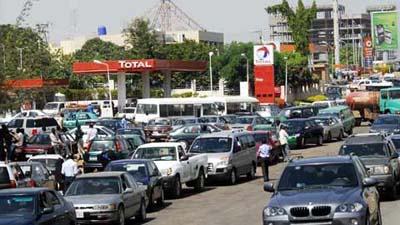The persistent fuel scarcity in the country is taking its toll on the residents of the Federal Capital Territory as transport fare has increased by between 50 per cent and 100 per cent.
A correspondent the News Agency of Nigeria who went round some parts of the territory in Abuja on Monday, reports that worst hit are civil servants and traders who waited endlessly at their various bus stops without much hope of getting vehicles.
Motorists, who managed to get the product after several hours of queuing at fuel stations, transferred the burden on passengers by charging almost double the normal fare.
Yusuf Yahaya, a civil servant, who lives in Lugbe on the Airport Road, said he suffered a lot of hardship at the bus stop while coming to work on Monday morning.
Yahaya said that he spent several hours before getting a vehicle and the driver charged him N150 for a distance that previously went for N100.
He said: “Can you imagine how long I waited at the bus top this morning without getting any vehicle?
“But because I have to get to work at all cost, I paid the extra unbudgeted fare.
“The situation is becoming worrisome and I think the authorities need to rise to the challenge before it is hijacked by the perceived enemies of the nation.”
Salamatu Biu, another civil servant, said that she had been paying more than the normal fare to get to work since the fuel scarcity started.
Biu said: “I used to pay between N300 and N400 to get to the office before, but now there is no day I pay less than N600 per drop from my house to the office, which means I spend N1,200 daily on transportation.”
Patience Ojo, said the fare from Nyanya to Maraba to the city centre, which used to cost between N100 and N150, had increased to between N200 and N300, depending on the destination.
Ojo said that the situation was being compounded with the non availability of small buses as the big buses were just doing skeletal services.
She said: “If you get to the bus stops, you will see a confused situation as commuters struggle to catch the few available vehicles.”
Ojo said her worry was how to get back home in the evening before she could think of coming to work the next day.
Oladele Henry, a commercial driver, who explained the reason why he had to charge extra fare, said he spent several hours at filling stations before getting fuel.
Henry said that the situation was not improving as the queue kept increasing at filling stations in the city.
Richard Koleoso, a motorist, said he had to go to the outskirt of the city to buy fuel.
Koleoso said it was sold for N130 per litre.
Koleoso said that he preferred to buy the fuel at any price rather than spending precious time at the filing stations.
Meanwhile, the Nigerian National Petroleum Corporation said it had increase fuel allocation to the Federal Capital Territory.
In a statement issued in Abuja, Dr. Omar Ibrahim, the Acting General Manager, Group Public Affairs Division, said the allocation of Premium Motor Spirit to Abuja had been increased from 100 trucks to 150 trucks per day.
Trending
- Lagos taskforce arrests, prosecutes 12 suspected land grabbers in Alausa
- Governor Adeleke engages 10,000 for Imole Youth Corps, says 250, 000 jobs created last two years
- Governor Okpebholo receives NULGE officials, assures of fruitful collaboration
- Nigeria’s Tax Reform Bill: A step towards economic transformation, by Abdullahi Hashim
- Kemi Badenoch unveils stricter UK immigration rules, seeks 15-year wait for citizenship + Video
- Gov. Okpebholo’s unshaken drive to recover Edo’s stolen assets, by Fred Itua
- NiDCOM boss celebrates Akinwunmi Adesina as he marks yet another birthday
- Abia governor signs security trust fund bill into law


